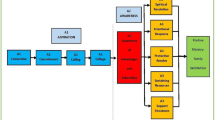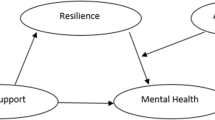Abstract
Previous research by Morris and Blanton (1994b) used the Denominational Support Service Checklist (DSSC) to determine whether or not denominations were providing support services in any organized/systematic way to the clergy and their wives in their denomination. The DSSC has a yes/no format containing 21 support services that are divided into four areas of support. The four areas of support services included psychological services (3), career development services (6), family oriented services (7), and financial services (5). As a follow-up to the previous study, the purpose of this study was to examine the perceptions of clergy husbands and their wives regarding the availability and importance of support services provided by their sponsoring denomination. The sample of the study included 136 ordained married clergy males and their non-clergy spouses (n=272) randomly selected from six denominations in the United States. The six denominations included the Southern Baptist Convention (SBC); Lutheran Missouri Synod (LMS); Church of God, Cleveland, Tennessee (COG); Seventhday Adventists (SDA); the American Baptist Church (ABC); and the Episcopal Church (EC). Each husband and wife completed The Perceived Availability of Denominational Support Services (PADSS) and The Perceived Importance of the Denominational Support Service (PIDSS). The PADSS has a yes/no format and the PIDSS is a 3 point Likert-type questionnaire that corresponds identically (e.g., 21 items divided into four support areas) with the DSSC. Findings from the study indicated that a majority of clergy and their wives perceived that their sponsoring denominations were not making available those services that they perceived were important. Additionally, gender differences in reports of availability and importance were found indicating that some denominations may not be providing support services that enhance the quality tof life for the entire clergy family system. Recommendations and suggestions are made to encourage and guide denominations in providing support services for clergy families.
Similar content being viewed by others
References
Anderson, G. (1963). Who is ministering to ministers?Christianity Today, 7, (8), 6–7.
Anderson, C. & Stark, C. (1988). Psychosocial problems of job relocation: Preventive roles in industry.Social Work, 33(1), 38–41.
Bakalinsky, R. (1980). People vs. profits: Social work in industry.Journal of Social Work, 25, 471–475.
Baker, D. & Scott, J. (1992). Predictors of wellbeing among pastor's wives: A comparison with nonclergy wives.The Journal of Pastoral Care, 46(1), 33–43.
Blackbird, T. & Wright, P. (1985). Pastors' friendships, Part 1: Project overview and an exploration of the pedestal effect.Journal of Psychology and Theology, 13(4), 274–283.
Bomberger, H. (1974). The parsonage: A way of family living.Lutheran Quarterly, 26, 58–63.
Boss, P., McCubbin, H. & Lester, G. (1979). The corporate executive wife's coping patterns in response to routine husband-father absence.Family Process, 18(1), 79–86.
Croskery, B. (1977). The wife's view of parish life.The Christian Ministry, 8(1), 10–13.
Dickman, F. (1988). The clergy. In F. Dickman, B. R. Challenger, W. Emener, W. Hutchinson, Jr. (Eds.)Employee assistance programs: A basic text. (pp. 438–442) Springfield, IL: Charles Thomas Publisher.
Faulkner, B. (1981).Burnout in ministry: How to recognize it, how to avoid it, how to avoid it. Nashville, TN: Broadman Press.
Gilbert, B. (1987).Who ministers to ministers? New York: Alban Institute.
Gleason, J. (1977). Perception of stress among clergy and their spouses.The Journal of Pastoral Care, 31(4), 248–251.
Goodling, R. & Smith, C. (1983). Clergy divorce: A survey of issues and emerging ecclesiastical structures.The Journal of Pastoral Care, 37 (4), 277–291.
Harris, J.C. (1977).Stress, power, and ministry. Washington, DC: Alban Institute.
Houts, D. (1977). Pastoral care for pastors: Toward a church strategy.Pastoral Psychology, 25(3), 186–196.
Hutchinson, I. & Hutchinson, K. (1979). The impact of divorce upon clergy career mobility.Journal of Marriage and the Family, 41(4), 847–855.
Jacquet, C. (1990).Yearbook of American & Canadian Churches. Nashville: Abingdon Press.
Jud, G., Mills, E. & Burch, G. (1970).Ex-pastors: Why men leave the parish ministry. Philadelphia: Pilgrim Press.
King, W. (1988).The clergy family project of the diocese of Alabama. Birmingham, AL: The Episcopal Diocese of Alabama.
Lavee, Y., McCubbin, H. & Olson, D. (1987). The effect of stressful life events and transitions on family functioning and well-being.The Journal of Marriage and the Family, 49(4), 857–873.
Lee, C. & Balswick, J. (1989).Life in a glass house. Grand Rapids, MI: Zondervan.
Mace, D. & Mace, V. (1980).What's happening to clergy marriages?. Nashville: Abingdon.
Mickey, P. & Ashmore, G. (1991).Clergy families: Is normal life possible?, Grand Rapids, MI: Zondervan Publishing.
Mills, E. & Koval, J. (1971).Stress in the ministry. Washington, DC: Ministry Studies Board.
Morgan, R. (1982). Any balm in Gilead for divorced clergy?The Christian Ministry, 13(3), 24–28.
Morgan, R. (1987). What's being done for divorced clergy?The Christian Ministry, 18(1), 24–25.
Morris, M. L. & Blanton, P. (1992a). The denominational support services checklist. Unpublished instrument, University of Tennessee.
Morris, M. L. & Blanton, P. (1992b). The availability of denominational support service. Unpublished instrument, University of Tennessee.
Morris, M. L. & Blanton, P. (1992c). The importance of denominational support service. Unpublished instrument, University of Tennessee.
Morris, M. L. & Blanton, P. (1994a). The influence of work-related Stressors on clergy husbands and their wives.Family Relations, 43, 189–195.
Morris, M. L. & Blanton, P. (1994b). Denominational perceptions of stress and the provision of support services for clergy families.Pastoral Psychology, 42(5), 345–364.
Pargament, K. L., Kennell, J., Hathaway, W., Grevengood, N., Newman, J. & Jones, W. (1988). Religion and the problem-solving process: Three styles of coping.Journal for the Scientific Study of Religion, 27, 90–104.
Portner, J. (1983). Work and family: Achieving a balance. In H.I. McCubbin & C.R. Figley (Eds.),Stress and the family: Vol. 1. Coping with normative transitions (pp. 163–177). New York: Brunner/Mazel.
Rassieur, C. (1982).Stress management for ministers. Philadelphia: The Westminister Press.
Ruark, K. (1977). Clergy divorce and subsequent career mobility. Unpublished doctoral dissertation, Florida State University, Tallahassee, Florida.
Stevenson, R. (1982). Children of the parsonage.Pastoral Psychology, 30(3), 179–186.
Walsh, D. (1982). Employee assistance programs.Milbank Memorial Fund Quarterly/Health and Society, 60, 492–517.
Whittemore, H. (1991, April 14). Ministers under stress.Parade Magazine, pp. 4–6.
Author information
Authors and Affiliations
Rights and permissions
About this article
Cite this article
Morris, M.L., Blanton, P.W. The availability and importance of Denominational Support Services as perceived by Clergy Husbands and their wives. Pastoral Psychol 44, 29–44 (1995). https://doi.org/10.1007/BF02251434
Issue Date:
DOI: https://doi.org/10.1007/BF02251434




